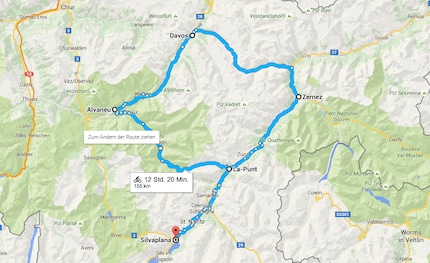"You're a professional athlete? And what do you really work as?"
Is there anything better than turning your passion into a career? I've been a professional sportswoman since I was 22. I train every day from morning to night - what more could a sports fanatic want? However, it's not always all sunshine and roses.
In Switzerland, professional athletes still have a rather low status. When I'm asked about my job and talk about my life as an athlete, I often hear: "And what do you really do for a living?". Understandable, because I'm not really at home much any more. Especially in the winter months, I try to escape the cold temperatures. So sometimes I spend long periods of time on the Canary Islands or somewhere else warmer in the world. While others sit in the office all day, I swim, cycle or walk around the world.
Thanks to my job, I've been able to visit places all over the world, places I might never have seen without sport. It's great that, at just 26 years old, I've already been able to get to know and appreciate so many different cultures, languages and people around the globe. In Cozumel, for example, which I really appreciate as a training location, I got to know someone who lets me stay in their holiday home during training sessions. I am touched by this hospitality.
In the meantime, I've got so used to the wonderful experiences that I get wanderlust when I'm in Switzerland for two or three months at a time. Conversely, I miss home when I spend longer periods abroad. I can't fly around all the time: travelling costs are a big budget item. Transporting my bike in particular is very expensive and sometimes costs almost more than my ticket. That's why I sometimes plan longer stays and take part in several races in one country.
That all sounds very nice and of course I understand that you can get envious. But it's not quite as easy as it looks and sounds.
Seven-day week
I actually train seven days a week, with one day off. Relief day means that I "only" train one sport at a time. On the other days, I train for five to six hours and usually two or all three sports. The whole thing varies depending on the intensity or length of the session, but I'll certainly be able to tell you more about this in a later article. As you can see, it's not quite so relaxed after all.
One day in July, for example, looked like this: I set off on my bike at 9.30am and, with a short break, was on the road for almost seven hours, cycling up and down one pass after another. Of course, I'm only sharing with you the pictures I took of the beautiful landscape throughout the day. You can't tell from these photos that the almost four hours I spent cycling uphill weren't always so easy. Or that I had to constantly fight against the wind on the last 20 kilometres, which was almost the only flat stretch. After the bike, it was time to change as quickly as possible, get into my running shoes and then run for another half hour at race pace. I was back home at 5.30pm and had literally been training all day.

Days like this are very strenuous and not always easy. There are always moments when you have almost no motivation and would rather stop. For me, however, it's precisely these training sessions that make me stronger day after day. It's like any other job: there are always jobs or training sessions that you'd rather do than others - and yet they all have to be done.
Your Céline ☺️
Even as a child, sport was an important part of my life. Since 2011 I have made sport my profession. As a professional triathlete I swim, ride and run through life and may call this my work. I am happy to report regularly about my adventures around the sport and from all over the world.
Interesting facts about products, behind-the-scenes looks at manufacturers and deep-dives on interesting people.
Show all